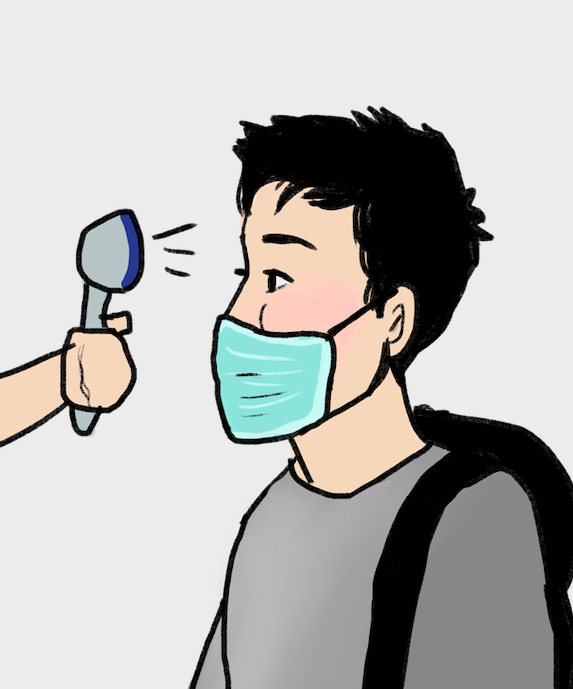Once we boarded the plane, I walked down the aisle with caution. To my left, a family of three covered themselves in sheets of protective plastic, and, to my right, an elderly couple equipped themselves with gas masks. With a pair of surgical gloves, a N-95 face mask, and a bottle of hand sanitizer tucked away in my backpack, I thought I was prepared for this flight.
It was an eerily silent trip across the Atlantic. The loudspeaker sounded only once to remind passengers to fill out a departure and arrival form. During the flight, the attendants had minimal contact with the passengers, and even our dinners, cold buns, were pre-packed in the front seat pocket.
After what seemed like an eternity, we were greeted by pouring rain at the Shanghai airport. The once-familiar sight of a crowded tarmac was replaced with endless empty gates. As far as I could see, we were the only plane in the vicinity.
Once our temperature was measured for the second time during the trip, the flight attendants escorted us out row by row. Almost immediately, Chinese workers in white hazmat suits greeted us. They instructed us to sit down in a booth to fill out another form, this time asking us for our home address.
The sight of booths and white hazmat suits didn’t stop until we reached the luggage carousel, where each luggage was individually sprayed with disinfectant. Lugging our heavy suitcases across the airport, we were directed to a booth corresponding to our residential district, Changning, where 13 anxious passengers boarded a bus to a designated hotel for all overseas travelers. Yes, hotels all over China were repurposed to become testing centers and isolated accommodations for travelers.
“This will be really quick and painless,” the worker said. She stood two feet away from me and slowly placed a cotton tip at the back of my throat, then repeating the procedure with my nose. After, she placed my sample in a tube to be sent away for testing. “Go to your hotel room now,” she then instructed. We stayed in the hotel that night, waiting for the results to come back, and were finally sent home for 14 days of home lockdown.
Overall, the trip home took 30 hours. It was shocking to experience China’s mandatory quarantine for all overseas travelers, which includes phone-tracking technology, home-surveillance systems, separate trash sorting, and daily temperature checks, all of which I am experiencing as I am writing this article.

This exhausting and effective process might raise some questions about breaches of individual privacy in America, but the Confucian emphasis on group wellbeing allows such interventions to take place. What we can say from our experience is that this process is mobilized by selfless medical workers, all of whom were gentle and kind as they carried out their duties. I felt safe and informed during the whole process, and it will surely be one of the most memorable experiences in my life.
Although our reality is merely one out of millions, we hope, by sharing our story, to radiate positivity and hope that this virus can be defeated. The initiatives that Deerfield students are leading show us that compassion and gratitude are always welcome. When a new normal emerges post-COVID-19, let’s carry forth that activism and blaze a trail, the impact of which will be felt across the world, from New York all the way to Shanghai.

